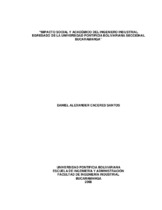Mostrar el registro sencillo del ítem
Impacto social y académico del ingeniero industrial egresado de la Universidad Pontificia Bolivariana Seccional Bucaramanga
| dc.contributor.advisor | Moreno Gómez, Nelson Enrique | |
| dc.contributor.author | Cáceres Santos, Daniel Alexander | |
| dc.coverage.spatial | Seccional Bucaramanga. Universidad Pontificia Bolivariana. Escuela de Ingenierías. Facultad de Ingeniería Industrial | spa |
| dc.coverage.temporal | 2008 | |
| dc.date.accessioned | 2013-06-21T20:23:09Z | |
| dc.date.available | 2013-06-21T20:23:09Z | |
| dc.date.issued | 2013-06-21 | |
| dc.identifier.uri | http://hdl.handle.net/20.500.11912/320 | |
| dc.description | 134p.: (pdf); il; gráficas; tablas; anexos | spa |
| dc.description.abstract | La presente investigación tiene como objetivo general, medir el impacto social, empresarial y académico de los egresados del programa de Ingeniería Industrial de la UPB seccional Bucaramanga, con base en los criterios y factores definidos por el CNA para facilitar la toma de decisiones en el fortalecimiento de los programas y el compromiso adquirido de acreditación. Las políticas de mejoramiento continuo y la constante búsqueda de la excelencia por parte de la UPB, la obligan a buscar reconocimientos para sus programas académicos, los cuales certifiquen la calidad y veracidad de la educación ofrecida. Siendo la Facultad de Ingeniería Industrial, la de mayor crecimiento y evolución durante los últimos años, el papel que juega lograr reconocimientos y certificaciones es de vital importancia, por esto se tomo la decisión, de entrar en el proceso de acreditación, cumpliendo con lo estipulado en la ley 30 de 1992, la cual busca promover la competencia como factor de calidad entre las instituciones de Educación Superior. Para lograr ser acreditada, la Facultad de Ingeniería Industrial debe cumplir con los lineamientos estipulados según el consejo nacional de acreditación, dentro de estos existen varios factores, en los cuales se encuentra el factor 7 “características asociadas a los egresados e impacto sobre el medio”, para dar cumplimento en lo allí estipulado, se realizó esta investigación, la cual evalúa la calidad del egresado del ingeniero industrial, sus competencias, sus fortalezas, debilidades e impacto sobre el medio, así como también se elabora un análisis comparativo, de la facultad frente a otras facultades a nivel regional, nacional e internacional. Y por último se analizan los retos para la formación del ingeniero industrial del año 2020. La investigación arroja como conclusión principal, que el egresado de la Facultad de Ingeniería Industrial de la UPB, ejerce un papel importante sobre el medio, con la creación de empresas, generación de empleos y desempeño óptimo en sus obligaciones laborales. Sobresaliendo sus fortalezas de emprendimiento y liderazgo, por último se realizan varias recomendaciones a la Facultad de Ingeniería Industrial de la UPB de cara al futuro y la globalización. | spa |
| dc.description.abstract | This research aims to generally measure the social impact, business and academic graduates of the programme of Industrial Engineering of the UPB sectional Bucaramanga, based on the factors and criteria defined by the CNA to facilitate decision-making in strengthening of programmes and the commitment of accreditation. The policies of continuous improvement and constant quest for excellence by the UPB, forced to seek recognition for their academic programs, which certify the accuracy and quality of education offered. Being the Industrial Engineering faculty, of fastest growing and evolution over the past few years, the role to achieve recognition and certification is vitally important, that is why it was taken the decision to enter the accreditation process, complying with the requirements by law 30 of 1992, which seeks to promote competition as a factor in quality among higher education institutions. For Achieve to be accredited, the faculty of Industrial Engineering must comply with the guidelines stipulated under the national council for accreditation, within these there are several factors, which is the factor 7 " features associated with graduates and impact on the environment " , To comply in the stipulated there, it was conducted this investigation, which evaluates the quality of the graduate industrial engineer, their skills, their strengths, weaknesses and impact on the environment, and it also develops a comparative analysis of the faculty compared to other faculties at regional, national and international levels. And finally discusses the challenges for the formation of industrial engineer in 2020. The research casts as a main conclusion, that graduated from the Faculty of Industrial Engineering at UPB, exerts an important role on our environment, with enterprise development, employment generation and optimum performance in their work. Excelling their strongholds of entrepreneurship and leadership, finally there are made several recommendations to the Faculty of Industrial Engineering at UPB towards the future and globalization. | spa |
| dc.language.iso | es | |
| dc.publisher | Universidad Pontificia Bolivariana | spa |
| dc.rights | Attribution-NonCommercial-NoDerivatives 4.0 International | * |
| dc.rights.uri | http://creativecommons.org/licenses/by-nc-nd/4.0/ | * |
| dc.subject | Ingeniería industrial | spa |
| dc.subject | Tesis y disertaciones académicas | spa |
| dc.subject | Trabajo de grado ingeniería industrial | spa |
| dc.subject | Acreditación institucional - ingeniería industrial | spa |
| dc.subject | Educación superior - Colombia | spa |
| dc.subject | Proyecto educativo institucional | spa |
| dc.subject | Ley 30 de 1992 | spa |
| dc.title | Impacto social y académico del ingeniero industrial egresado de la Universidad Pontificia Bolivariana Seccional Bucaramanga | spa |
| dc.type | bacherlorThesis | spa |
| dc.rights.accessRights | openAccess | spa |
| dc.type.hasVersion | publishedVersion | spa |
| dc.identifier.instname | instname:Universidad Pontificia Bolivariana | spa |
| dc.identifier.reponame | reponame:Repositorio Institucional de la Universidad Pontificia Bolivariana | spa |
| dc.identifier.repourl | repourl:https://repository.unab.edu.co/ |
Ficheros en el ítem
Este ítem aparece en la(s) siguiente(s) colección(ones)
-
Trabajos de grado [6440]
Monografías, artículos, informes, proyecto de grado


